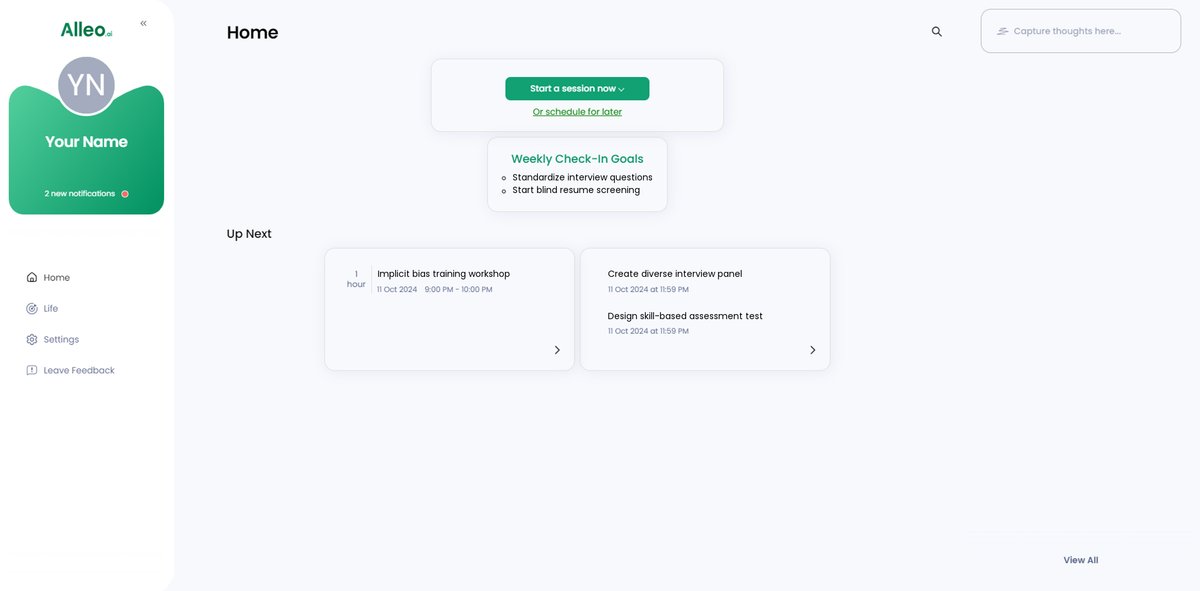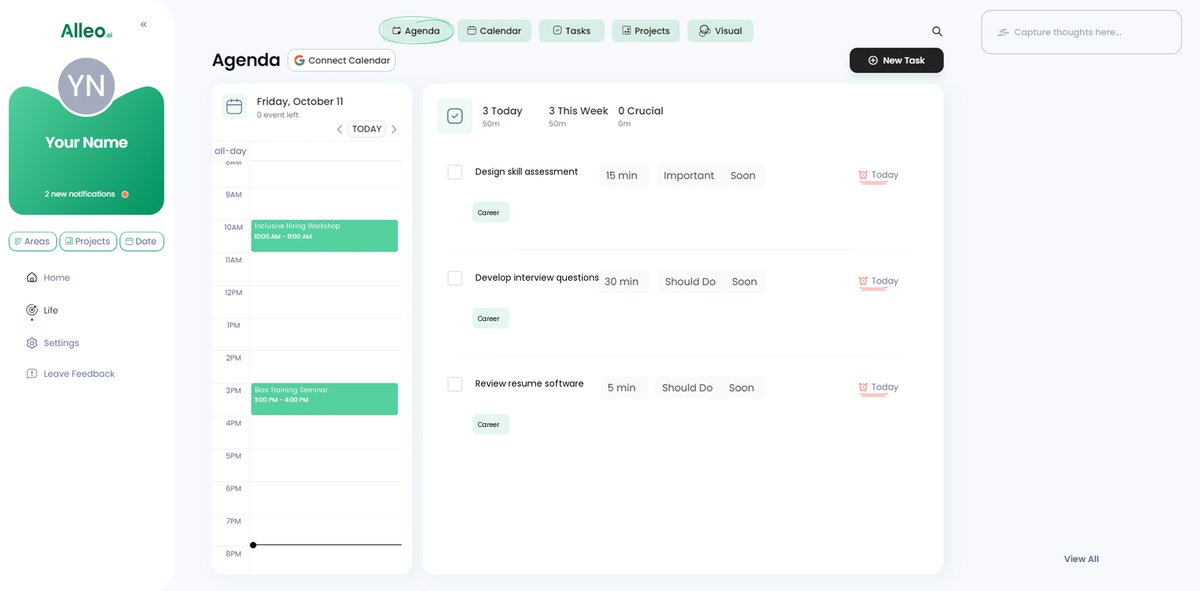The Ultimate Guide to Implementing Inclusive Hiring Practices for HR Managers
Imagine a hiring process where every candidate feels valued and assessed solely on their abilities. This is the essence of inclusive hiring strategies HR professionals strive for.
As a life coach, I’ve seen many HR managers struggle with biased hiring practices. These unconscious biases in hiring can hinder diversity and fairness in the workplace, impacting equal opportunity employment.
In this article, you’ll discover actionable diversity recruitment strategies to implement inclusive hiring practices.
We’ll explore standardized interview questions, blind resume screening, implicit bias training, skill-based assessments, and diverse interview panels – all key components of inclusive interview techniques.
Let’s dive into these workplace diversity initiatives.

Understanding the Depth of Biased Hiring Practices
HR managers often face the challenge of biased hiring, which can be subtle yet damaging. Many clients initially struggle with recognizing how ingrained biases affect their recruitment processes, highlighting the need for inclusive hiring strategies HR professionals can implement.
This can lead to a significant lack of diversity and fairness in the workplace, underscoring the importance of diversity recruitment strategies.
Ignoring these biases not only reduces diversity but also increases the risk of legal issues. Moreover, it affects team dynamics and innovation, emphasizing the need for addressing unconscious bias in hiring.
For example, only 28% of UK employers train interviewers on legal obligations and objective practices, revealing a widespread problem (source). This statistic highlights the need for more inclusive interview techniques.
Without addressing these issues, organizations miss out on a diverse talent pool. You don’t want to fall into that trap, which is why implementing inclusive hiring strategies HR teams can rely on is crucial.

A Roadmap to Inclusive Hiring Practices
Overcoming this challenge requires a few key steps. Here are the main areas to focus on to make progress with inclusive hiring strategies HR.
- Standardize interview questions for all candidates: Develop consistent, job-related questions to ensure fairness and implement inclusive interview techniques.
- Implement blind resume screening: Use software to anonymize resumes, removing names and other identifying details to reduce unconscious bias in hiring.
- Provide implicit bias training for HR managers: Organize mandatory workshops and follow-up sessions to improve cultural competence in HR.
- Use skill-based assessments in hiring process: Design assessments that simulate real job tasks to support equal opportunity employment.
- Create diverse interview panels: Include members from different backgrounds and departments to enhance diversity recruitment strategies.
Let’s dive into these inclusive hiring strategies HR!
1: Standardize interview questions for all candidates
Standardizing interview questions is a key inclusive hiring strategy HR professionals use to ensure fairness and consistency in assessing all candidates.
Actionable Steps:
- Develop a consistent set of interview questions tailored to each job role.
- Focus on job-related skills and experience, using inclusive job descriptions as a guide.
- Train interviewers on using these standardized questions and inclusive interview techniques.
- Conduct workshops to practice and refine their questioning techniques, addressing unconscious bias in hiring.
- Monitor and review the effectiveness of standardized questions regularly.
- Collect feedback from interviewers and candidates to identify areas for improvement in diversity recruitment strategies.
Explanation: Standardizing interview questions helps eliminate bias and ensures each candidate is assessed equally, supporting equal opportunity employment.
This method aligns with industry trends favoring structured interviews for fairness. According to the CIPD, structured interviews are crucial for reducing bias in hiring processes and promoting workplace diversity initiatives.
Key benefits of standardized interview questions:
- Ensures fair comparison between candidates
- Reduces unconscious bias in the interview process
- Improves consistency in hiring decisions and supports diverse candidate sourcing
Standardized questions pave the way for a more inclusive recruitment process, enhancing cultural competence in HR practices.

2: Implement blind resume screening
Blind resume screening is a crucial inclusive hiring strategy for HR, ensuring candidates are evaluated based solely on their qualifications and skills, reducing unconscious bias in hiring.
Actionable Steps:
- Use software to anonymize resumes by removing names and identifying details.
- Research and select a reliable tool tailored for blind resume screening and diverse candidate sourcing.
- Train HR staff on the significance and process of blind screening.
- Conduct training sessions and provide resources on effectively using the software and promoting cultural competence in HR.
- Analyze the impact of blind screening on the diversity of shortlisted candidates.
- Regularly evaluate data to ensure the process is fostering a more diverse candidate pool and supporting workplace diversity initiatives.
Explanation: Implementing blind resume screening helps eliminate unconscious bias during the initial stages of hiring. By anonymizing resumes, HR managers can focus solely on the candidates’ abilities and experience, promoting equal opportunity employment.
This practice aligns with industry trends favoring skill-based assessments for fairer hiring processes. According to a report, automated tools can significantly aid in reducing biases in hiring (CIPD).
Implementing these steps will help create a more inclusive hiring process, complementing other diversity recruitment strategies.

3: Provide implicit bias training for HR managers
Implicit bias training is essential for HR managers to recognize and mitigate unconscious bias in hiring, a crucial aspect of inclusive hiring strategies for HR professionals.
Actionable Steps:
- Organize mandatory implicit bias workshops for all HR employees.
- Partner with experts to deliver engaging and informative training sessions on diversity recruitment strategies.
- Conduct regular follow-up sessions to reinforce training.
- Schedule quarterly reviews and discussions to keep bias awareness top of mind and improve cultural competence in HR.
- Encourage self-assessment and reflection through tools like the Implicit Association Test.
- Provide access to online self-assessment tools and encourage regular use to address unconscious bias in hiring.
Explanation: Implementing these steps ensures that HR managers are continuously aware of and working to reduce biases in hiring, supporting equal opportunity employment.
This approach aligns with industry trends favoring continuous learning and self-reflection in inclusive hiring strategies for HR.
According to a report, ongoing training and evaluation are crucial for maintaining effective inclusive hiring practices.
Key components of effective implicit bias training:
- Interactive workshops and real-world scenarios on diverse candidate sourcing
- Regular refresher courses and updates on inclusive interview techniques
- Practical strategies for bias mitigation in daily work, including creating inclusive job descriptions
Focusing on these practices will help create a more equitable hiring process and support workplace diversity initiatives.

4: Use skill-based assessments in hiring process
Using skill-based assessments is one of the key inclusive hiring strategies HR teams can employ to ensure that candidates are evaluated based on their abilities relevant to the job role.
Actionable Steps:
- Design assessments that simulate real job tasks, focusing on equal opportunity employment.
- Collaborate with department heads to create relevant skill tests that address unconscious bias in hiring.
- Incorporate these assessments into the early stages of the hiring process as part of diversity recruitment strategies.
- Ensure all candidates complete the assessments before moving to interviews, promoting inclusive interview techniques.
- Regularly update and validate the assessments to support workplace diversity initiatives.
- Gather feedback from current employees and hiring managers to ensure assessments remain relevant and effective for diverse candidate sourcing.
Explanation: These steps are crucial for reducing bias and ensuring fair hiring practices, a key aspect of inclusive hiring strategies HR professionals should implement.
Skill-based assessments focus on candidates’ actual abilities rather than subjective factors, promoting cultural competence in HR.
According to a report by Northeastern University, a skills-based approach can lead to higher retention and deeper loyalty among employees.
Implementing skill-based assessments will help you build a fair and effective hiring process, supporting inclusive onboarding processes.

5: Create diverse interview panels
Creating diverse interview panels is crucial for ensuring fair and unbiased hiring decisions, which is a key component of inclusive hiring strategies HR professionals should implement.
Actionable Steps:
- Identify and train diverse employees to participate in interview panels.
- Develop a training program focused on fair and unbiased interviewing techniques to address unconscious bias in hiring.
- Ensure each panel includes members from different backgrounds and departments.
- Create a scheduling system to rotate panel members and promote diversity recruitment strategies.
- Evaluate the performance and feedback of interview panels.
- Collect data on the effectiveness of diverse panels and make necessary adjustments to support equal opportunity employment.
Explanation: Diverse interview panels help mitigate biases and provide varied perspectives in the hiring process. This practice aligns with industry trends emphasizing inclusive hiring strategies HR teams are adopting.
According to SHRM, diverse panels can significantly reduce bias and enhance the hiring process.
Benefits of diverse interview panels:
- Broader perspective in candidate evaluation, supporting cultural competence in HR
- Reduced risk of unconscious bias in hiring
- Enhanced cultural fit assessment as part of workplace diversity initiatives
Implementing these steps will foster a more inclusive and fair recruitment environment, contributing to overall inclusive hiring strategies HR departments can employ.

Partner with Alleo on Your Inclusive Hiring Journey
We’ve explored the challenges of implementing inclusive hiring strategies HR professionals face, their benefits, and actionable steps. But did you know Alleo can make this journey easier and faster for your diversity recruitment strategies?
Set up an account and create a personalized plan with Alleo to address unconscious bias in hiring and develop inclusive job descriptions. The AI coach will follow up on your progress, handle changes, and keep you accountable via text and push notifications as you work on diverse candidate sourcing and equal opportunity employment practices.
Ready to get started for free with inclusive hiring strategies HR teams can implement? Let me show you how to enhance your cultural competence in HR and improve your inclusive interview techniques!
Step 1: Log In or Create Your Account
To begin your journey towards inclusive hiring practices, log in to your existing Alleo account or create a new one to access personalized guidance and support.

Step 2: Choose “Building better habits and routines”
Click on “Building better habits and routines” to develop consistent practices that will support your inclusive hiring efforts, helping you implement and maintain the strategies outlined in the article more effectively.

Step 3: Selecting the life area you want to focus on
Choose “Career” as your focus area to address inclusive hiring practices and create a more diverse workplace, aligning with the strategies discussed in the article for fair recruitment processes.

Step 4: Starting a Coaching Session
Begin your journey towards inclusive hiring practices by scheduling an intake session with Alleo’s AI coach to create a personalized action plan for implementing the strategies discussed in this article.

Step 5: Viewing and managing goals after the session
After your coaching session on inclusive hiring practices, check the Alleo app’s home page to view and manage the goals you discussed, such as implementing standardized interview questions or creating diverse interview panels.

Step 6: Adding events to your calendar or app
Use Alleo’s calendar and task features to schedule and track your progress on implementing inclusive hiring practices, allowing you to set reminders for training sessions, diverse panel interviews, and skill-based assessments.

Embrace the Future of Inclusive Hiring
By now, you understand the tangible benefits of inclusive hiring strategies HR professionals can implement. You’ve learned actionable diversity recruitment strategies to make your recruitment process fairer and more effective.
I know it can feel overwhelming, but remember, every small step counts. Start with one strategy, like addressing unconscious bias in hiring, and build from there.
Imagine the impact on your team and organization. You’ll foster a more diverse and innovative workplace through equal opportunity employment practices.
Take the first step today. Commit to implementing these inclusive hiring strategies HR teams can use.
And don’t forget, Alleo is here to support you every step of the way. Try it for free and see the difference it can make in your inclusive recruitment process.